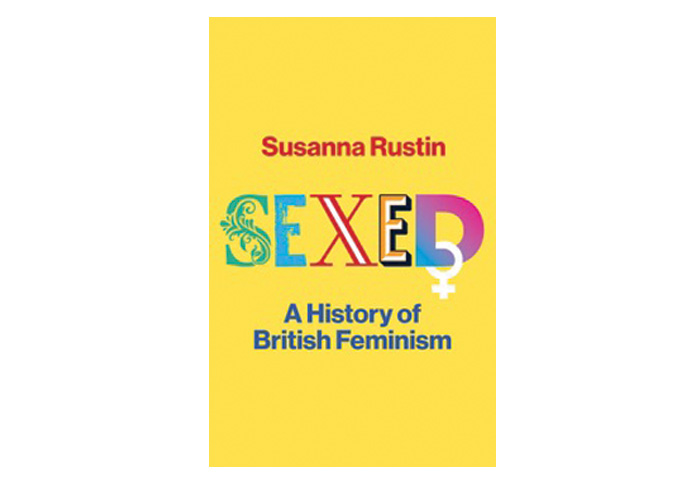Vive la difference
Maggie Gruner talks to the author of a new book that takes a radical look at women’s rights campaigning
Thursday, 19th September 2024 — By Maggie Gruner

Susanna Rustin [Ludo Hunter-Tilney]
METAL gags and tubes were used to force-feed suffragettes on hunger strike in Holloway Prison, and many were left with lasting injuries.
Jailed campaigners for votes for women began going on hunger strike in 1909 in protest against their treatment as criminals rather than political prisoners.
Female prisoners are a striking presence in a new book exploring the long, hard battle for women’s rights, and emphasising how the biological reality of sex has played a key role, and continues to do so.
In Sexed: A History of British Feminism, Susanna Rustin, who works at The Guardian in Islington, describes the work of heroes of the struggle for rights and reform, including penal reformer Elizabeth Fry.
Fry, who recognised the “sexualised nature” of the abuse women prisoners faced, opened a school at the City of London’s Newgate Prison in 1816 and persuaded the authorities to separate women from men.
Largely as a result of Fry’s efforts, in 1823 the law was changed so that prisons would be inspected and visited by chaplains, and female prisoners would have female guards.
She also established the first hostels or halfway houses for released women prisoners.
Rustin’s book takes us from 1792, when Mary Wollstonecraft (who set up a school in Newington Green) published A Vindication of the Rights of Women, through campaigns for female education, the vote, parental and property rights, justice – to the sex-based rights movement of today and contemporary controversies over sex and gender.
Rustin, who lives in Queen’s Park, describes how mid-19th century feminist activists the Langham Place (Westminster) group campaigned for women’s property rights, education and jobs.
Leading light Barbara Bodichon studied at Bedford College, Bloomsbury, and co-founded Girton College, Cambridge.
Another campaigner was Frances Buss, pioneering headmistress of the North London Collegiate School and later the Camden School for Girls.
Some of the book’s women should be better known than they are – such as Eleanor Rathbone, who lived in Westminster and later Highgate and was an Independent MP.

She saw childbearing as the key to understanding the ways in which women were disadvantaged and campaigned for family allowances (now child benefit).
One of the most impressive women featured in the book is crusading Victorian Josephine Butler, who hatched a plan with newspaper editor William Stead to expose trafficking of girls into the sex trade.
The plan involved buying a 13-year-old girl from her mother for £5 in the Marylebone slums. The publicity stunt spurred the raising of the age of consent from 13 to 16.
Butler led the campaign against the Contagious Diseases Acts, which enabled forcible genital inspections of prostitutes.
She was assaulted and excrement was thrown at her. Bales of straw were set alight below a hayloft, the venue for a women-only meeting, and stones were thrown, breaking the windows.
There are echoes, perhaps, today. Rustin writes that at one of the first gatherings organised by opponents of the proposed self-identification law, in 2017, a woman was physically assaulted.
Meetings organised by groups including Woman’s Place UK and events featuring gender-critical (sex-based rights) speakers “have repeatedly been the target of threatening attacks including smoke bombs, abusive chanting, and banging on windows aimed at drowning out speakers”.
Rustin emphasised to Review that “it’s only a minority of trans activists who have been physically aggressive. But it’s also important to recognise the impact on women who have been threatened, attacked or intimidated.”
She thinks the aggression is part of “a general pattern of male aggression and violence against women”.
This situation has worsened. The book quotes the 193,566 sexual offences recorded by police in England and Wales in the year ending March 2022, and the Crime Survey of England and Wales’s estimate that a further 600,000 female victims did not report crimes.
Among feminists Rustin writes about are Southall Black Sisters, and Justice for Women, who campaigned on behalf of women imprisoned for killing their violently abusive male partners.
Rustin claims the “disastrous failure to regulate digital platforms has led to the proliferation of online misogyny and contributed to a growing sense that women and girls can be abused with impunity.”.
She asserts that sex-based rights activists believe that women’s lower wealth and status, and their vulnerability to specific kinds of harm, “cannot be tackled without taking sex into account”.
Women are susceptible to female cancers, have specific requirements from health systems and are far more likely than males to be victims of sexual violence.
Rustin confronts the sex and gender issue squarely, and her tone is measured.
She writes: “It is perfectly possible to disagree fundamentally with trans activist aims while supporting the right of transgender people to be protected against discrimination.”
The book chronicles disagreement among feminists. For example, some thought Eleanor Rathbone’s emphasis on motherhood would hold women back; Florence Nightingale didn’t support women’s access to medical training.
Former Hampstead (comprehensive) School pupil Rustin, a leader writer on social affairs at the Guardian, said: “The relationship between feminism and other forms of politics (liberalism, socialism, anti-colonialism) has never been easy or straightforward.”
Her book is thoughtful and thought-provoking, the women in it inspiring.
Rustin – a former Green Party local election candidate in Highbury East, who helped set up London’s only community (or parish) council, in Queen’s Park – said Sexed has received some great reviews, though she doesn’t expect everyone to agree with her.
“The book is published in the US in September and I’ll be interested to see the reaction there.”
• Sexed: A History of British Feminism. By Susanna Rustin, Polity, £20